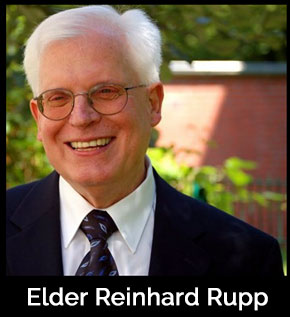German Responses to Expanded “Unity” Procedure
19 September 2018 |
Elder Reinhard Rupp, retired president of the North German Union and an elder statesman of the church in Germany, has drafted a personal response to the expanded “unity” procedure proposed by the General Conference leaders.
 “Sometimes,” writes Elder Rupp “it is no longer the original problem which causes troubles, but the way the crisis is managed.” He draws on the story of the disciples facing the Sanhedrin in Acts 4 and 5 as a model for dealing with unions which have been recalcitrant with regard to the 2015 San Antonio vote on women’s ordination.
“Sometimes,” writes Elder Rupp “it is no longer the original problem which causes troubles, but the way the crisis is managed.” He draws on the story of the disciples facing the Sanhedrin in Acts 4 and 5 as a model for dealing with unions which have been recalcitrant with regard to the 2015 San Antonio vote on women’s ordination.
He explains how in Acts, the disagreement was resolved by Gamaliel, who emphasized God’s influence on the consciences of the apostles.
Elder Rupp writes,
As loyal and God fearing citizens the apostles never questioned the authority of the Sanhedrin. They never would have acted against its decisions, except in a conflict of loyalties. So even when confronted with the threat of death (Acts 4:19,20,33; 5:29) the apostles would follow their Lord – and their conscience. After San Antonio, 2015, a number of SDA Unions in different divisions felt unable to react positively to the vote of San Antonio. They too normally never would question the authority of the General Conference. If these men refuse obedience to our worldwide church, then it is because of a serious conflict of loyalties.
You can read Elder Rupp’s entire statement here in German, and here in English.
Berlin-Mitteldeutsche Vereinigung Conference (composed of much of what used to be East Germany) has also issued a statement in regard to the “unity” discussions. This statement is unique in that it appears to be the first to bring up the competence of the General Conference leadership. It can be read here in German, and here in English.
The statement says,
Believing in Jesus Christ, we are convinced that trust and voluntariness are fundamental values of the Christian community. In loyalty and solidarity, church members are committed to their local church, give their tithing and carry the free church with their gifts. We object to obedience through restriction and pressure. This violates freedom of expression and conscience, creates a climate of fear, and destroys a church based on trust and voluntarism. Jesus says, “You know that the rulers hold down their people and the mighty do them violence. That is not how it should be among you; but whoever wants to be great among you, let him be your servant; and whoever will be first among you, let him be your servant, just as the Son of man did not come that he may be served, but that he may serve and give his life as a ransom for many “(Mt 20:25-28). Believing in Jesus Christ, we are convinced that our Free Church is built on the authority of the church base. The role of church leadership is to serve the community by recognizing and supporting the diversity of its manifestations. Church leadership is accountable to the community.
The conference statement makes three recommendations:
As a consequence, we call the members of the General Conference Executive Committee,
- to reject the documents of the Unity Oversight Committee at the Annual Council in October,
- to dissolve the Unity Oversight Committees which have been established without involving the Executive Committee and which, consequently, are unlawful
- to ensure that the Church leadership preserves the above stated values of the Church.
The third point concludes with this provocative request of the GC ExCom: “Furthermore it has to be clarified whether the current Church leadership continues to have a vote of confidence.”
Dear Adventist Today readers: I’m inserting this note to tell you that we are right now conducting our autumn fundraiser. Adventist Today is largely a volunteer organization, but if we’re going to continue to provide you with stimulating news—often news you get nowhere else—and fascinating commentary by some of the best writers in the denomination, we do need some financial support. I hate begging you, but right now we need to: our treasurer, Paul Richardson, tells me that we’re at our lowest point for a long time. If you want to see us continue to do the journalism that you’ve been accustomed to from Adventist Today, would you follow this link and give us a gift now? Loren Seibold, Executive Editor, Adventist Today website and magazine.




